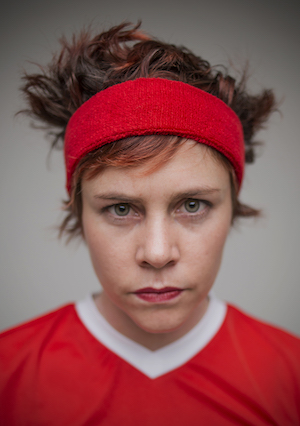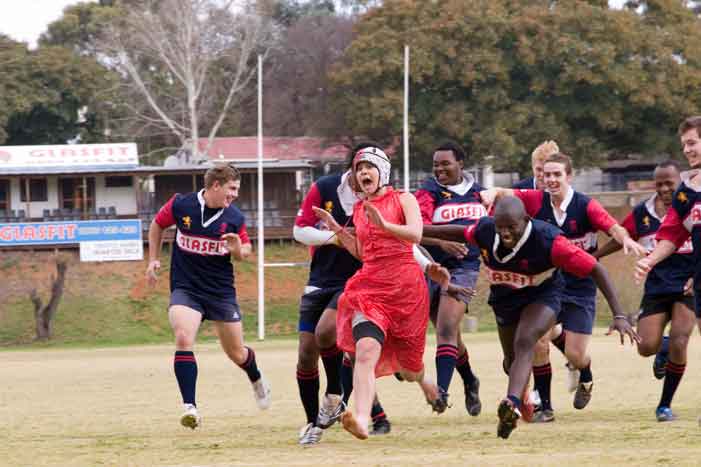 Anthea Moys is an artist, a teacher, a play facilitator, a life long learner, runner and a bad singer who started an experimental choir. Anthea wears many hats, but her main passion lies in designing informal and experimental social learning experiences, where people can connect, create and play through the arts. In 2008 she completed her Masters at Wits with a focus on play and performance in public space. In 2013 she won the Standard Bank Young Artist Award for Performance Art (inaugural) where she created her “Vs.” series, which embraced failure and reimagined winning as the act of learning itself. She has travelled widely as an artist and play facilitator. In May 2015 she participated in the Johannesburg Pavilion residency at the 56th Venice Biennale. In April 2017 Anthea was the keynote speaker for CounterPlay festival in Denmark and more recently she was a resident artist and researcher at The Capital of Children as part of the LEGO Foundation in Billund, Denmark. Most recently Anthea has won a studentship at Northumbria University in Newcastle to complete a 3-year practice-led PhD with a specific focus on sport, play and contemporary performance looking at the games people play in the global north vs the global south. Anthea lives, learns, works and plays (for the most part) in Johannesburg, South Africa.
Anthea Moys is an artist, a teacher, a play facilitator, a life long learner, runner and a bad singer who started an experimental choir. Anthea wears many hats, but her main passion lies in designing informal and experimental social learning experiences, where people can connect, create and play through the arts. In 2008 she completed her Masters at Wits with a focus on play and performance in public space. In 2013 she won the Standard Bank Young Artist Award for Performance Art (inaugural) where she created her “Vs.” series, which embraced failure and reimagined winning as the act of learning itself. She has travelled widely as an artist and play facilitator. In May 2015 she participated in the Johannesburg Pavilion residency at the 56th Venice Biennale. In April 2017 Anthea was the keynote speaker for CounterPlay festival in Denmark and more recently she was a resident artist and researcher at The Capital of Children as part of the LEGO Foundation in Billund, Denmark. Most recently Anthea has won a studentship at Northumbria University in Newcastle to complete a 3-year practice-led PhD with a specific focus on sport, play and contemporary performance looking at the games people play in the global north vs the global south. Anthea lives, learns, works and plays (for the most part) in Johannesburg, South Africa.
Anthea Moys interviewed by Marcio Carvalho

Today there is a gap between image and essence. Images they can distort the essence of a people, a place, a culture, etc, making them distorted, unworthy. Does your work try to restitute both, for better understandings of what lies behind stereotypes and epistemic colonialities?
From the outset, I think it should be noted that in response to these specific questions, I am first and foremost an artist, not a theorist, not a historian. There is still so much I have to learn about colonization and decolonization. I have answered here from my experience as an artist.
Over the past decade, I have created a diverse body of performance works that adopt a playful approach in their desire to create art that is inclusive, participatory and inspires a sense of agency in the world. Growing up in post-apartheid South Africa one of the aims of my practice is to inspire a sense of empathetic human interconnectedness through play.
An example of this is the Vs project: In response to being the inaugural winner of the Standard Bank Young Artist Award for Performance Art in South Africa, I created a project called “Anthea Moys vs the City of Grahamstown” (2013) that, through a series of contests where I single-handedly challenged several teams to their own games, attempted to collectively reimagine winning as the act of learning from and with instead of conquest over another.
In my work, sport is material that could symbolically refer to colonialism, war, hierarchies and systems that support various binaries such as successful/unsuccessful, strong/weak, hero/villain, and winner/loser. I use play to subvert and destabilize, to shake up and ‘mess with’ the current ‘order’ of things. In this way my practice allows me to explore the liberating qualities of play in relation to the rule-bound characteristics of sport through performance. Within the current political climate and as long as there are binaries of rich/poor, powerful/powerless and oppressors/oppressed, art that inspires curious and brave playful agency is critical for human development and transformation. I adopt a playful curious approach with my participants that inspire ‘changing the rules of game’ so as to invite another way to play and relate to the game and to one another. In so doing, the work attempts to destabilize hierarchies.
Perhaps it is playful decolonization?!
Is decolonize to
Reshuffle
Recreate
Dabble with
Mess with
Trifle with
Muck about with
Play differently with
history and remake it anew?!
In my work I have always made it a point to take the work OUTSIDE of the normal confines of the gallery or theatre. I prefer the work to happen in unusual places that are specific to the work at hand. So, depending on whom I am working with, for example a boxing ring downtown, a rooftop, the public streets, a soccer field. I think it is important and interesting to take the audience out of their comfort zones to the art and to take the art out into the public domain where it can be seen closer to everyday life.
For these upcoming festivals, I propose to leave South Africa to go and, if they will have me, learn more about Africa in these cities. I propose to work with African/Middle Eastern immigrants that have relocated and are now living in Stockholm/Bergen/Turku. I propose to develop something with them during the week prior to each festival date. At this point in time, we do not know what the performance/story is. This is scary, but good! We will mess with, disrupt, play with the story. It could be a song, a dance, a prayer, a war cry. This will then be showed probably outside of the festival venue. This is also scary, but GOOD! Very good. In this way the work will be developed in situ and the audience will be asked to take a step out of their comfort zones, the ‘known’ story and enter into a space of the largely unknown, the developing story. The story that will investigate, with curiosity, what playful decolonization could be... !
Today it's impossible to talk about knowledge without tapping into education. It seems that our education systems they became quiet obsolete in their pedagogies and their forms of knowledge. We still study based on Eurocentric views about the world, which in turn deprive students from a better understanding about the past and consequently a lack of tools to deal with and imagine many presents and futures still to come. What is your opinion about how academy is dealing with knowledge? And If you could use art, or art systems to decolonize the university and make it more pluriversity, and to re-invent the classroom, what would you do?
DECOLONIZING THE ACADEMY:
I would create spaces for the sharing of knowledge – each one, teach one – where learning from the other trumps beating them. You could come and share anything here: your mom’s best soup recipe, how to play a game your grew up with, safest routes to get around town. All the while the most important thing would be to really bear witness to this person who is sharing and teaching, to learn to be really curious about what they are sharing as well as curious about your response. To develop a practice of heightened curiosity, where we literally celebrate our differences through learning something new from that person.
And ALL kinds of DOING and NOT DOING are welcome in all kinds of ways – everything is up for questioning. New rules of play are engaged and designed with players at the outset of every session, until organically rules become accepted.
Some questions...
Why is a playful approach necessary especially for the youth? What are the alternatives? How do we create spaces for vulnerability to co-exist with courage and bravery? How are we creating re/creating history today? How are we retelling it? How am I doing this? Is it possible to engage and create without doing/saying? What about not doing, not saying? What about listening? Where are our senses? How do we make sense of the world? In history, in herstory, in play, in eye-contact, in passing, in fear, in love: Where is the body? What does playful embodied decolonization look like, taste like, sound like, feel like?
